”Sports for all” is highly associated with sports in Denmark, e.g. with the intentions of the National Olympic Committee and Sports Confederation of Denmark (Danmarks Idræts-Forbund/DIF). The slogan covers the cultural contents of the Danish sports landscape and also leads me to emphasize the potential and popularity of the intersection between sports and corporate social responsibility (CSR) whether focus is on the elite or grassroots levels. Given the fact that Denmark is a very active sports nation (from a holistic perspective including on and off the field aspects), the slogan makes perfect sense at a time when CSR has grown rapidly as a meaningful concept in corporate and personal agendas. This includes feelings of how individuals and organizations in Denmark are motivated to apply social responsibility as a catapult to form (often commercial) partnerships, which can benefit sporting and societal agendas and hence facilitate value for all engaged partners.
The reason for me writing this post is that I came across a good example in Germany in the beginning of September when the German national football team and its players exploited their popular societal role as football stars to articulate the importance of a united front in taking care of the political refugees seeking asylum in Europe, see here. However, there are also good Danish examples and hopefully they can kickstart even more initiatives that strive to make a positive societal difference via sports.
Photo: Different Danish footballers supporting the ‘Good for Goals’ campaign.
The ‘Good for Goals’ campaign that was initiated a couple of months ago in Denmark involved a range of corporate sponsors (e.g. Audi Denmark, Select, Dekra, Munin Sports and Alka) that donated money for every goal scored in the Danish Super League (football/soccer) throughout week 39. On top of that, the Danish FA (DBU) counted all goals scored during the week from the U6 to the highest elite levels. The collected money supported Danish broadcasters DR and TV2’s fundraising campaign to help people in need from Syria. DR and TV2 supplemented the sponsorship based fundraising with a SMS-campaign during the week of the ‘Good for Goals’ initiative. Together, the campaign collected approximately DKK300,000 to refugees from Syria (Munin Sports, 2015).
Photos: Different Danish football reporters tweeting their support for the ‘Good for Goals’ campaign. Per Frimann adding a humorous touch aimed at his colleague Carsten Werge’s footballing competencies 😉
This campaign acts as a good example os showing how Danish football, its clubs and players along with media companies and corporate sponsors can articulate the product of football while using that platform to create positive societal impact. That is what CSR in sports is all about. Moreover, the campaign has a strategic direction in that it adds valuable content for media companies and sponsors given their investments in football and altogether it enhances the reputational capital of the involved parties. Activation of players and coaches builds emotional equity with all stakeholder groups in the football economy and is therefore a necessary element when optimizing CSR-campaigns in sport. The activation of players was evident when FC Nordsjælland dressed up in themed ‘Good for Goals’ t-shirts for their warm-up for the home game against AGF. All clubs in the Danish ‘Alka’ Super League (men’s league) and the ‘3F’ League (women’s league) supported the campaign and star players of the leagues like Daniel Agger, Nicolai Jørgensen, Johan Elmander, Erik Sviatchenko, Rasmus Würtz, and Theresa Nielsen activated the hashtag #goodforgoals and #scorforsyrien (score for Syria) on their social media platforms and encouraged kids, adolescents and adults to find the inner goal-getter and score some goals.
Photos: Male and female players from Brøndby IF supporting ‘Good for Goals’ on Instagram.
Different scholars (Davies, 2002; Smith & Westerbeek, 2007) argue that actors within the context of sports should be visible in relation to local, regional, national and global responsibilities and that sports have the ability to act in accordance with ‘utilitarian principles[1]’. My own research points to the fact that football clubs have been highly involved in CSR-based partnerships for quite some time. Consider examples like FC Barcelona’s partnership with UNICEF, Chelsea FC’s social engagements (e.g. donation of money to victims from the earthquake in Haiti in 2010) or the local club B1909 in Odense, Denmark, which received a sports price from the Danish Ministry of Culture in 2009 for a marvelous effort to integrate kids in troublesome positions through DIF’s project ‘Get2Sport’. In terms of the latter, B1909 collaborated with schools to arrange ‘football schools’ and tutoring for kids in need. Mentioning the Danish CSR-model, the interdisciplinary collaboration among public and governmental entities (e.g. municipalities), private corporations, NGOs and sports organizations presents a good path to lift CSR-based partnerships in sports.
From a strategic point, it also makes sense for sponsors to engage in CSR-based partnerships in sports. Munin Sports is one of the sponsors that spent resources on the ‘Good for Goals’ campaign. It seems like a good investment for a company like Munin Sports that is highly associated with the football economy via its football rebounders. So, the engagement with a football-loving audience provides a relevant, clever and meaningful link between the ‘Good for Goals’ campaign and the financial bottom-line of Munin Sports. The clever issue in this sponsorship involvement for Munin Sports is that the support of refugees in Syria is connected with the core essence of football, i.e. to score goals to win a football game and to win on and off the pitch. Along with that, scoring goals and supporting a relevant up-to-date cause like the refugee situation regarding Syria equals more than one way to produce positive emotions among football fans and thus a better engagement platform. Time and context are vital factors when evaluating CSR-based partnerships in sports and these factors are well-chosen in this regard for what reason it is more effective to create positive brand transfers. The Munin Sports example is aligned with the empirical data from some of my own research that point towards that corporate sponsors take part in establishing good experiences for their ‘fans’ to use a sports metaphor as that is a modern and sustainable way to utilize brand management and CSR in sports.
[1] The Utilitarian Principle’ is the meaning of “the greatest good for the greatest number of people”, i.e. to do something good for as many people as possible (Frederick, 2002).
Sources:
Davies, R. (2002) ‘Sport, Citizenship and Development: Challenges and Opportunities for Sports Sponsors’, World Sports Forum, Lausanne.
Munin Sports. (2015). http://muninsports.com/da/good-for-goals-indsamler-til-nodhjaelp/
Smith, A. & Westerbeek, H. (2007). Sport as a Vehicle for Deploying Corporate Social Responsibility. Journal of Corporate Citizenship, 25, pp. 43-54.
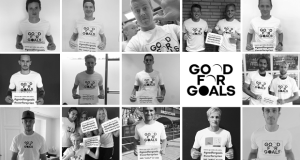
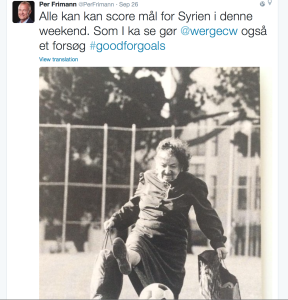
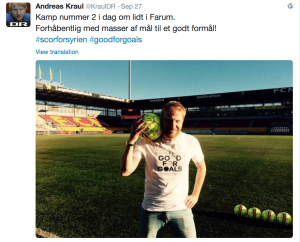
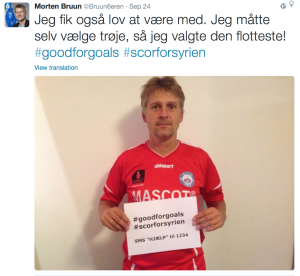
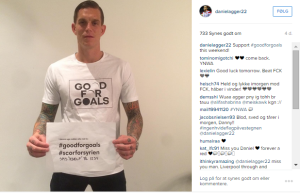

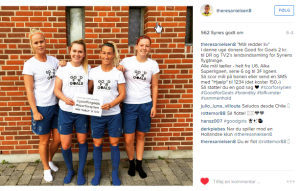
COMMENTS
No comments yet.